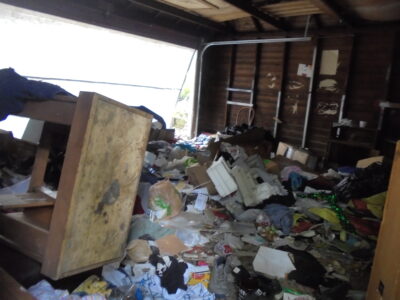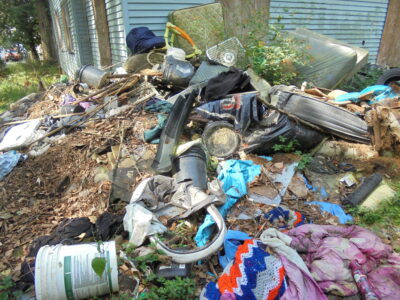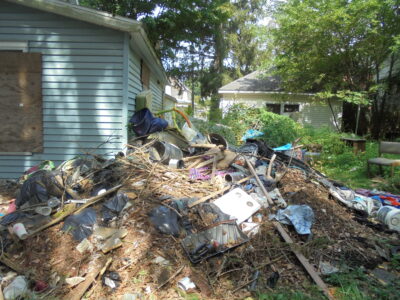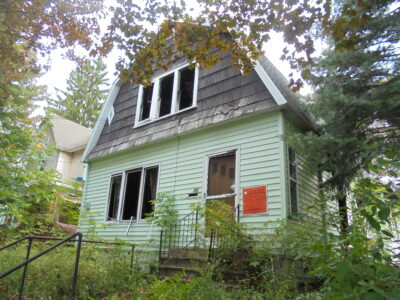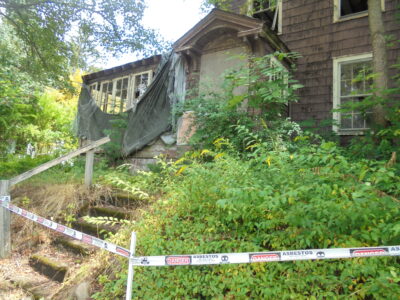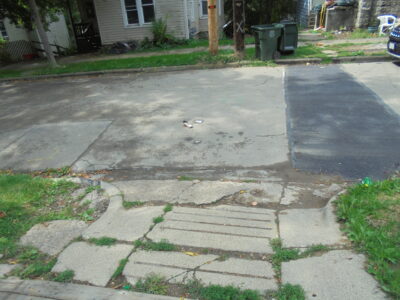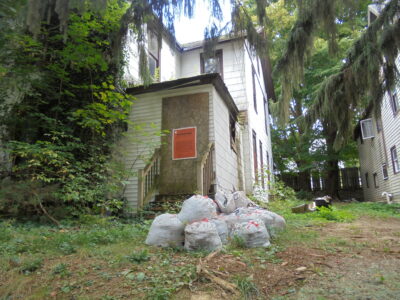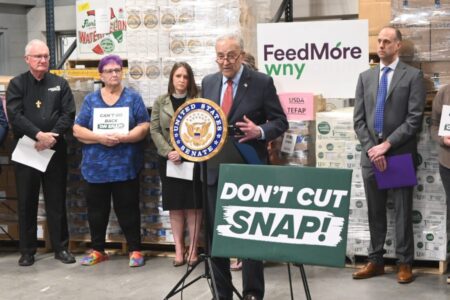‘You Wouldn’t Believe’
Fulton Street Residents Look Out For Each Other In Deteriorating Neighborhood
- An inside look at a shed behind a condemned house on Fulton Street where residents told the Post-Journal drug users come to use drugs and sleep. P-J photo by Sara Holthouse
- Another pile of garbage left behind a Fulton condemned house. P-J photo by Sara Holthouse
- One of the multiple piles of garbage left by drug users behind one of Fulton’s condemned houses.
- The condemned house on Fulton Street that residents told the Post-Journal drug users locked someone in and then set it on fire, recently, forcing them to jump out of the window. P-J photo by Sara Holthouse
- Another condemned house on Fulton Street, recently marked with asbestos warnings by the city. P-J photo by Sara Holthouse
- Pictured is the end of someone’s driveway and part of the conditions of the sidewalks on Fulton Street. P-J photo by Sara Holthouse
- A condemned house on Fulton Street, where people have piled bags of their garbage. P-J photo by Sara Holthouse
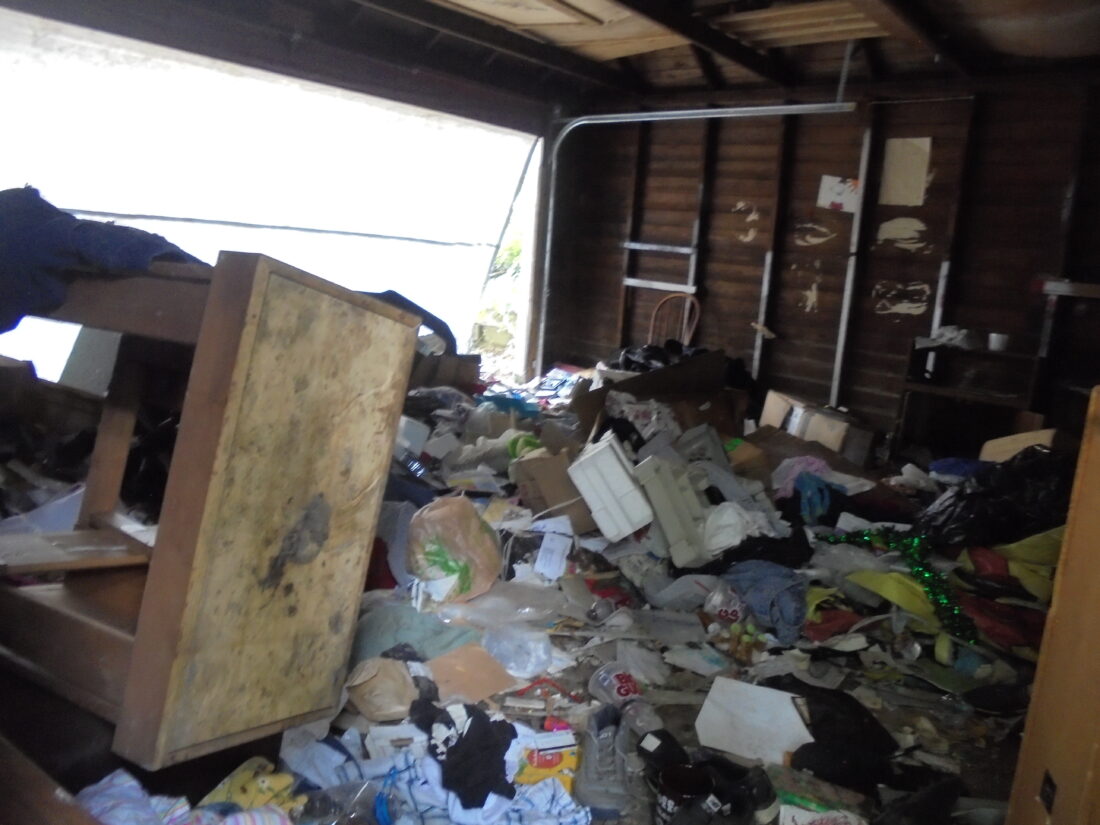
An inside look at a shed behind a condemned house on Fulton Street where residents told the Post-Journal drug users come to use drugs and sleep. P-J photo by Sara Holthouse
Imagine; empty, condemned houses up and down the street, drug users walking past on the sidewalks, needles left in people’s front yards, sidewalks essentially unusable, especially for those with disabilities, being kept awake at night because of screaming, fighting and violence at all hours.
What has been described is something that Raven Corvus, who resides at the corner of Fulton and East Eighth streets said is something she would expect to find in America’s bigger cities such as Seattle, where she used to live, and not in a place like Jamestown. But it is the reality of what she and any other resident of the Fulton Street neighborhood have to live with on a daily basis.
The issues on this street are not something new, rather they are something residents have been dealing with and trying to have something done about since the end of last year. Issues on Fulton Street have been a recurring theme of City Council meetings since last year.
‘WE TRY TO STOP THEM’
Corvus, along with two other Fulton Street residents, Paul Wolff and Larry Coon, said many of the condemned houses on the street are used for drug activity and people are squatting in them or camping in backyards.
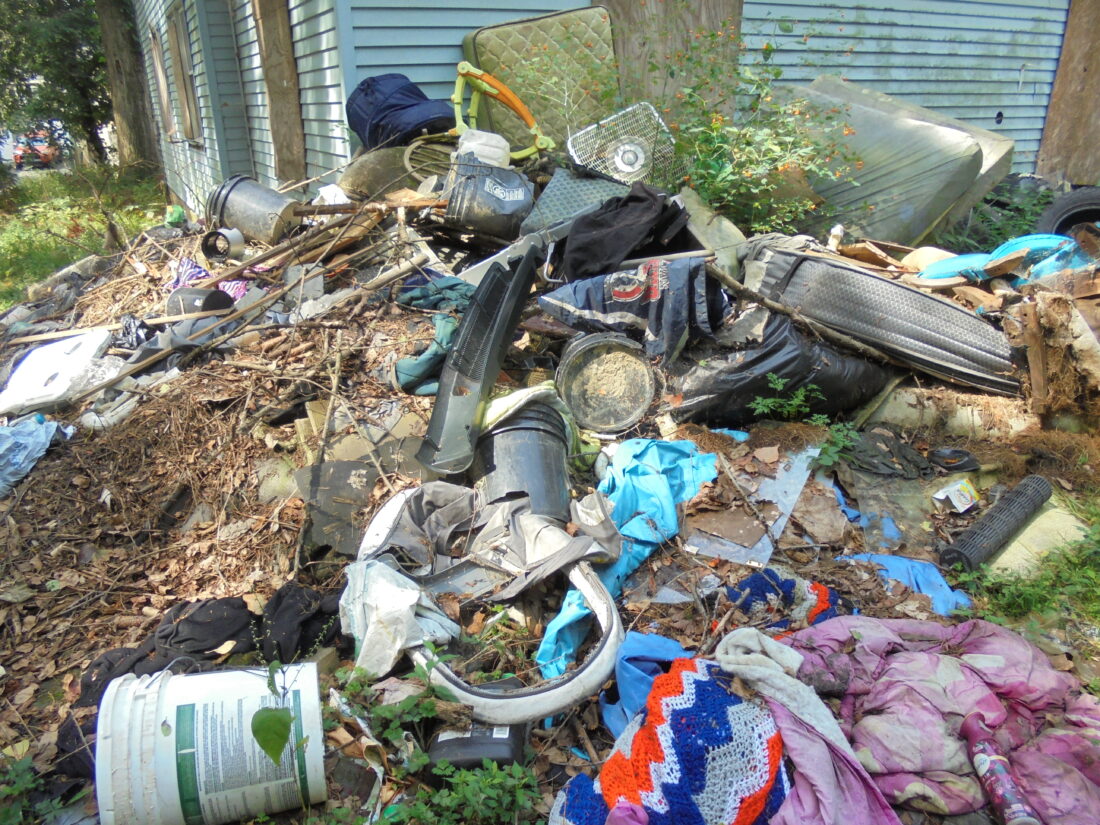
Another pile of garbage left behind a Fulton condemned house. P-J photo by Sara Holthouse
“I have to chase squatters out of the house next door to me all of the time, because it’s for sale … I know if they get in there it’s game over,” Corvus said. “So, we try to stop them.”
People have already been inside and stripped wires — something else that the three area residents said also happens a lot throughout the street — and Corvus said she did not know how the house would be sold. She added that “literally like every other house on Fulton Street is condemned.”
Both Corvus and Wolff discussed the foot traffic from people they say are drug users on the street, some of whom they knew by name because of how long they have been in the neighborhood and how often they see them doing something. Some are harmless, the Fulton Street residents said, but there are others that create concern, such as a man who walks around with a sword and another that walks around with “a homemade spear.”
“You wouldn’t believe some of the stuff you see around here,” Corvus said. “I moved here from Seattle, and it’s better than it was there, and it’s better than a lot of the bigger cities, but it’s sad because it’s really a beautiful area and I don’t see how they want to bring in tourism; when you have a tourist who takes a turn down Fulton they’re going to be like, ‘are we in Detroit?'”
Coon expressed that one of his biggest problems with everything is the severe decline in population the city has seen over the past 15 or 16 years. All of the houses left in disarray, not only on the street but in the city, Corvus said, are bought by people who buy around six or seven houses through LLCs and then let them sit and rot.
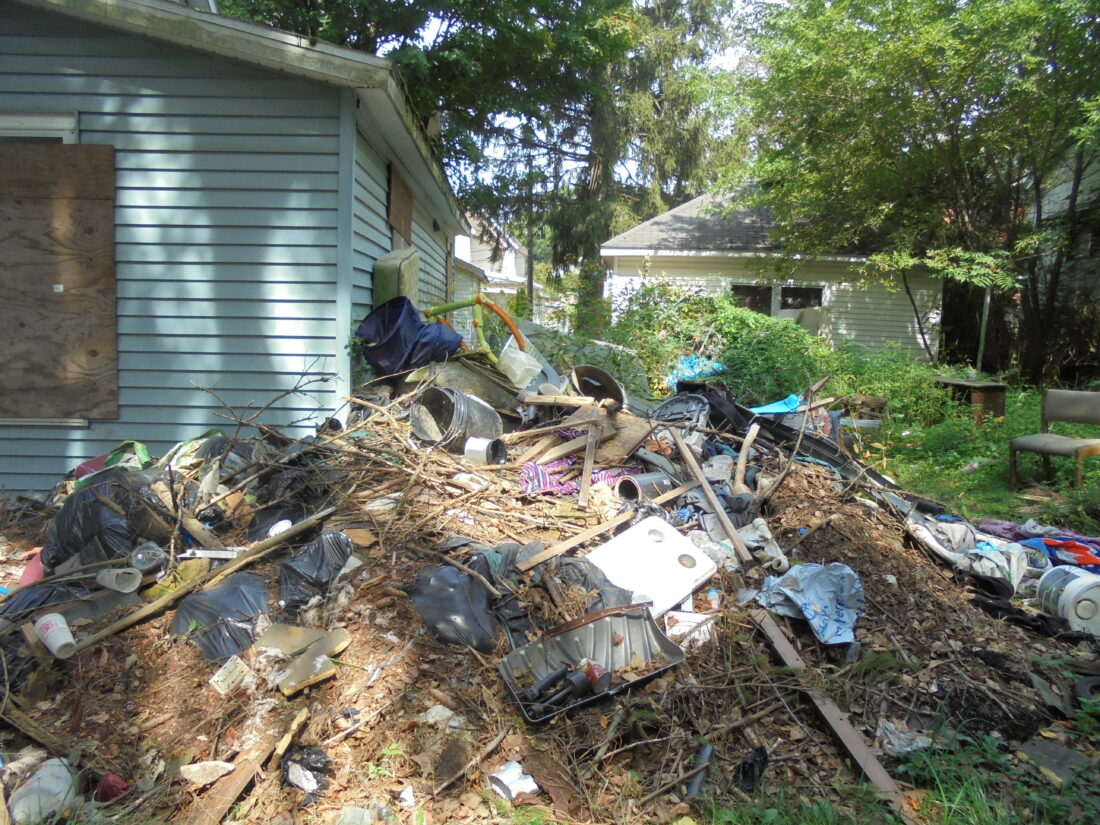
One of the multiple piles of garbage left by drug users behind one of Fulton’s condemned houses.
Some of the street’s problems can also be dated back to the state of emergency that was declared over the city’s homeless population around Third Street last year. Wolff said after the homeless population was “cleaned up” in that area, they migrated to Fulton Street and elsewhere in the surrounding areas.
“The reason they migrated here is because of the condemned buildings,” Wolff said. “They go in, they strip out the pipes, the wires, all that. We have a lot of drug houses around here, and there’s a house at the other end of Fulton that they take the scrap metal to and they get paid for scrap and then they take the money back to the drug houses that they’ve stripped and go to do what they’re going to do.”
Most of the problems, they said, come from the amount of condemned houses and the lack of fear that the drug users have of the city’s police. During a City Council work session at the beginning of August, it was reported that there have been 126 police calls to Fulton Street over the last six months from January to June, and all three residents said that probably around 80 of them have been for one specific resident.
STORY AFTER STORY
Other stories of things the group has experienced on the street include fires in the condemned houses, and one specific house where a group of drug users got “ripped off” by someone, so they lured them into the house and set it on fire.
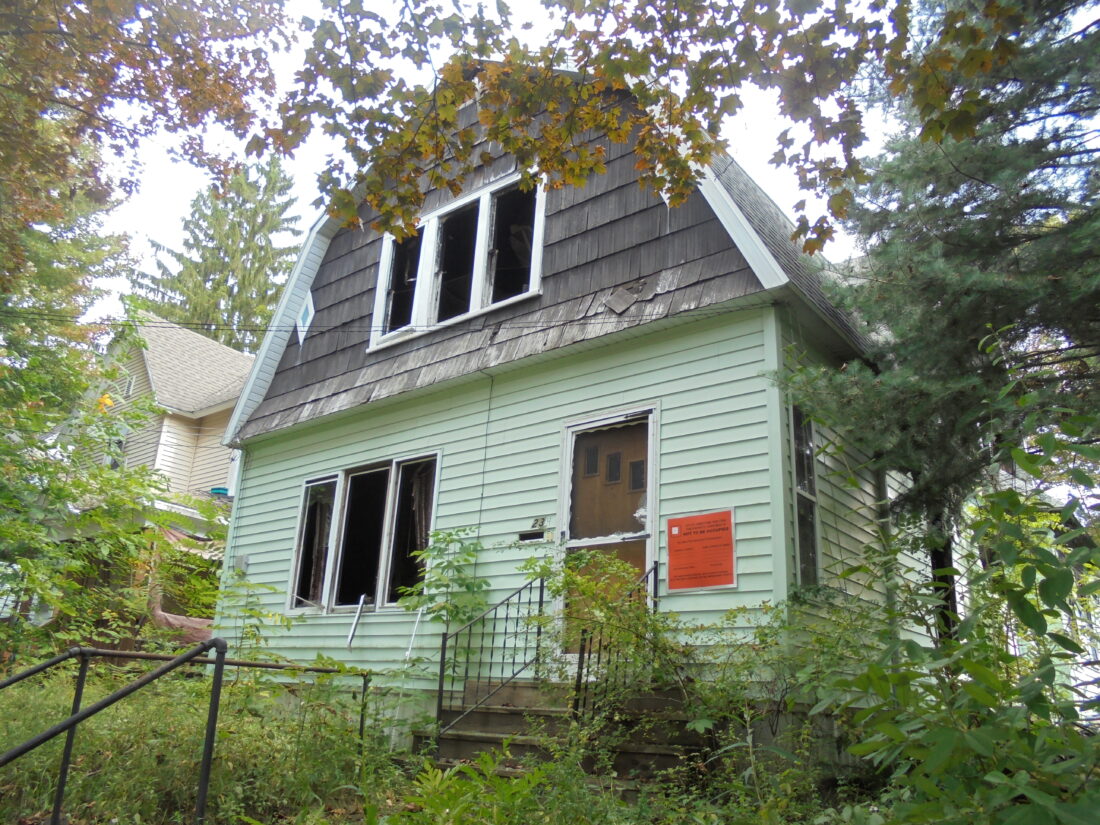
The condemned house on Fulton Street that residents told the Post-Journal drug users locked someone in and then set it on fire, recently, forcing them to jump out of the window. P-J photo by Sara Holthouse
“I actually heard him jump out the window and my neighbor across the street wrapped his arm up, because he was cut up and bleeding,” Wolff said. “These are the things we see. I thought it was just another day on Fulton when I heard the glass shatter. I wasn’t even worried until I saw him run down the street with blood pouring down his arm.”
Another example came from the street just the night before Corvus, Wolff and Coon talked with The Post-Journal, when Corvus said she had to call the police twice because someone at a neighboring house to Corvus was screaming at around 2 a.m., that they were going to burn down the house or murder someone. While the residents spoke with The Post-Journal, the screaming began again on a quieter scale.
They said things like this are things they have become accustomed to on the street; a street where families with children also live. Wolff expressed concerns with ways the city budget has been being used, saying that the budget is used for things like driveways for empty houses on other streets, and questioning why it was not being used to help places like Fulton.
Both Wolff and Corvus acknowledged that City Council members have become very responsive to them and have even come to their houses to talk about these problems. Additionally, Wolff said he also plans on running for City Council to try and help as well.
CHANGES COMING
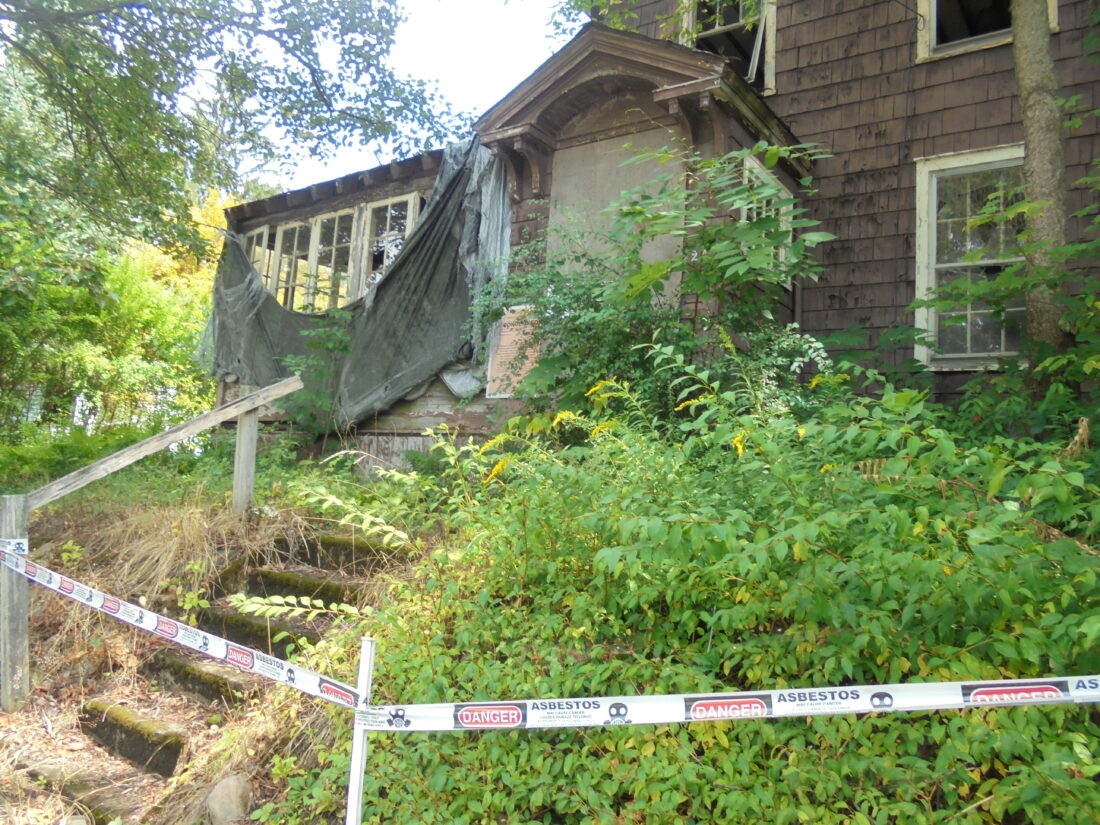
Another condemned house on Fulton Street, recently marked with asbestos warnings by the city. P-J photo by Sara Holthouse
The ongoing problems on Fulton Street have become an increasingly common topic at City Council meetings over the last few months, as more people have come to discuss what they have seen and City Council members discuss ways to try and help. Much of this focus is on the condemned housing, and specifically at the Housing Committee meeting at the end of August, it was said that many of the houses are slated for demolition soon. During the Sept. 8 Housing Committee meeting it was confirmed that houses on Fulton Street are slated for demolition either by the end of the month or the beginning of October.
At the August meeting, Crystal Surdyk, city development director, said several properties there are slated for demolition, adding that Chautauqua County Land Bank officials know Fulton Street is a priority. But, Surdyk said, there is only so much to be done as it all takes time.
“They’re going to see a big change in that neighborhood once those properties come down,” Surdyk said. “There’s not going to be a place for people to squat or break in or participate in that.”
Surdyk said they are doing what they can, and this includes the planned Pilot Residential Districts, which will focus on targeted areas, including Fulton Street and Cross Street. In these areas they have been able to acquire parcels and are looking into doing a number of strategic demolitions and that will then be followed by infill housing projects.
The CFA submissions the Department of Development sent into the state at the end of July after approval from council are to help put in the infrastructure in these identified districts so they can be ready for the incoming infill projects, including water lines, sewer, new sidewalks and the rest that is needed for a new house to be built. The plans to have the condemned houses demolished sometime in the next month were also spoken about at the latest voting session meeting, where councilmembers discussed coming to visit the street and the growing need to get something done.
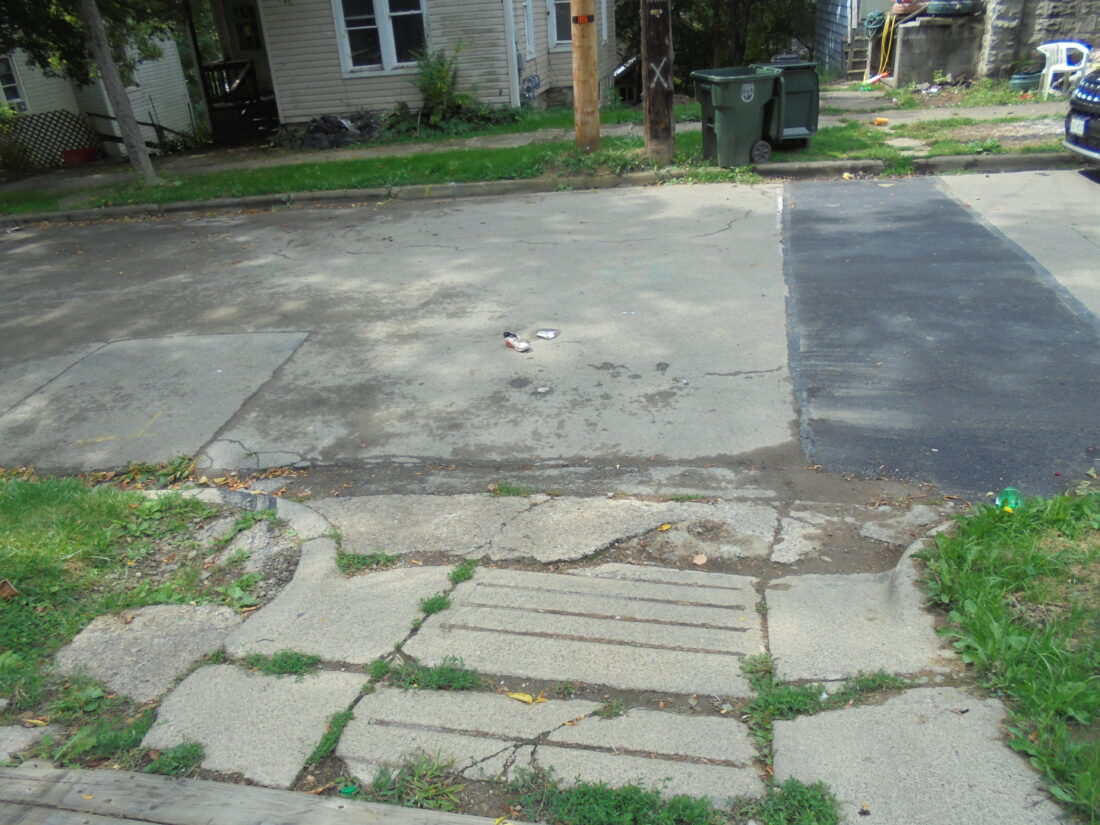
Pictured is the end of someone’s driveway and part of the conditions of the sidewalks on Fulton Street. P-J photo by Sara Holthouse
“It’s really something, so I think we all should work together and try and get something to them,” Councilman Randy Daversa, R-At Large, said at the meeting.
Council members at the voting session also noted that there has been an increased police presence in the area as well, though Wolff told the Post-Journal, from what he has seen a lot of this increased presence has involved shining a light in some of the houses and not much else.
BAIL REFORM CONCERNS
The New York State bail reform, which first came into effect in 2019, has also been cited by both city council members and the three residents who spoke with the Post-Journal as something that has been hindering the process of helping Fulton Street.
According to Data Collaborative for Justice, the state’s bail reform that was passed in 2019 was the first major reform to the state’s bail statute since the 1970s, and “limited the use of cash bail and pretrial detention mainly to violent felony offenses; established a presumption of release on recognizance for all cases except when a ‘risk of flight’ is present; and required consideration of people’s ‘individual financial circumstances’ when contemplating bail. The reform went into effect in January 2020.” They add that since this time, the reform has been amended three times.
Corvus expressed that to her the state’s bail reform has been leading to more crimes instead of less, adding that while it has been a struggle to get the police department to be able to do things for the street, she understands that they are still down officers. She acknowledged that they are overwhelmed and probably do not want to deal with Fulton Street every day, but that the bail reform also makes it so they are unable to make some arrests, and instead make appearance tickets. If the police were able to make more arrests, and if the condemned houses were gone, it was said that things would be better, and Wolff said he also planned to attend Senator George Borello’s meeting that will be held soon in Jamestown to see if he can have a chance to talk with him about the bail reform issue as well.
The group then talked about security measures that they have had to make on their own, including cameras, fences and dogs, and both Wolff and Coon added that they have spent time “in the system” themselves, but have changed their lives around.
“Anyone can change their life if they get out of their own way,” Coon said.
‘LOOK OUT FOR EACH OTHER’
While the Fulton Street neighborhood may seem overflowing with the bad, the three residents expressed that there is some good as well, in the form of other neighbors taking care of each other and people in general caring what happens to the neighborhood. People will cut each others’ grass, and bring things for people’s kids. Wolff said he moved Corvus’s garbage can that morning and Corvus said she is currently watching her neighbor’s plants. Everyone watches out for the kids of the neighborhood, they said, looking out for each other, sharing food, telling if garage doors are open, and warning each other of the people to watch out for.
“We look out for each other,” Wolff said. “We do what a neighborhood is supposed to do.”
People will gather together on each other’s porches and warn people about drug users leaving needles in yards and stopping others from cutting through their yards. Corvus said everyone talks and is concerned about the neighborhood, adding that the problems are not just on Fulton but are beginning to bleed through into other areas.
They said people are starting to speak up, and that it is a good thing that council members are beginning to come out and see the problems themselves, with the hope that things may begin to change.
“We’re all hard working people with families and we love our neighborhood,” Corvus said. “I like my neighbors, I like that everybody looks out for everybody. I came from Seattle, which I said before, and I was shocked when I first got here how everybody came and greeted me and was so nice. … Jamestown really is a beautiful city and we just care about it.”
Wolff said he grew up in a neighborhood in Niagara Falls that was a tight-knit community that was a neighborhood and how it was supposed to be, and how he wished Fulton Street could be. The group expressed that they want their neighborhood to be safe again, and that they are disheartened by hearing from some people in charge that there is nothing to be done. They added that logically, people will not get along with everyone in the neighborhood, but that should not mean the police being called every day. Corvus said she did not want to be afraid to do yard work, and Wolff said he did not want to have to sit on his porch with a tire iron, which is something that happens. The neighborhood has lost the feeling of being safe and secure, along with feeling able to rely on people in power in the city, they added, and that this is why people in the neighborhood are starting to speak up.
“We’re not the only neighborhood in the city like this, we’re not,” Wolfe said. “But, if the other neighborhoods want something to change, they need to speak up.”
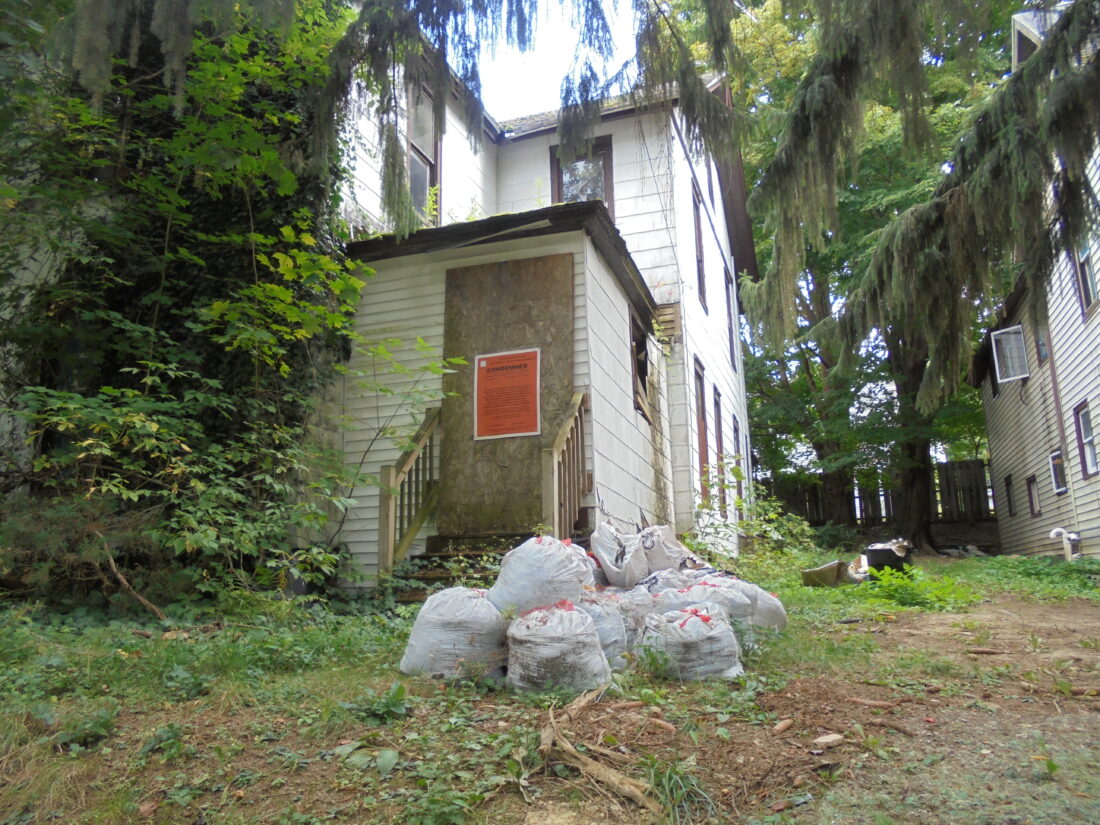
A condemned house on Fulton Street, where people have piled bags of their garbage. P-J photo by Sara Holthouse

